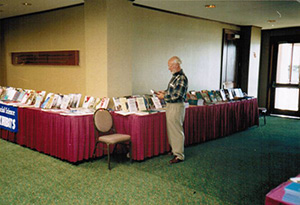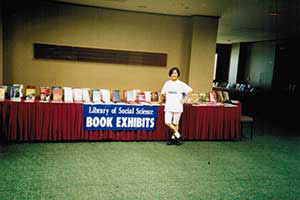| The Philosophy of Book Exhibits By Richard A. Koenigsberg |
||||
| This is the second in a series of Newsletters on the history of Library of Social Science. To read the first installment, please click here. |
||||
So there I was in July 1988—in a hotel in Secaucus, NJ—at the book exhibit of the International Society of Political Psychology—standing at a table, talking to colleagues and selling books. Having been absent from the academic world for 17 years, I was excited—thrilled even—to partake of civilization. Denis Snook, the conference organizer, had persuaded several other publishers to participate in the exhibit. For four days we existed in a cozy little space, meeting and greeting attendees. I recall Denis continually walking around the entire space, checking things out. He was in charge of the meeting, and wanted to make certain things proceeded smoothly. He frequently wandered by the book exhibit—observing Mei Ha and me rapping with conferees and writing up orders—having a good time. He never spoke a single word—just watched. Finally, after three or four days, we packed up and were about to depart. I saw Snook, walked up him, shook his hand, and said, “Thanks so much for being so courteous.” He was somewhat bemused: “Why are you thanking me? I didn’t say a word to you throughout the entire conference.” Then he reflected for a moment, “Ah, I guess letting someone do their own thing is the greatest form of courtesy.” This statement—that has become mythical for me—set the stage for everything that was to follow. After the meeting, Denis and I began a dialogue that continued for several years. The ideas we developed established the foundation for Library of Social Science Book Exhibits (although we barely had a clue that we were starting a “company”). Denis is a veteran of the Vietnam War who didn’t feel good about having participated. His devotion to the field of political psychology contained an element of “making amends.” Beginning in 1981 (until 1992), he was conference organizer for every single ISPP meeting. He received a pension from the US government—who thus supported his efforts to establish this new field. Most of Snook’s time revolved around planning and organizing the ISPP conference. Having witnessed my performance in 1988, he asked me to take over running the book exhibit. He had plenty of other things to do. In spite of his offer to pay all of my expenses, I declined to work on the 1989 ISPP book exhibit in Israel (a confirmed Manhattanite, I experienced even Queens as a foreign country). I consented, however, to organize the book exhibit for the 1990 ISPP meeting at the Mayflower Hotel in Washington, DC. I created a two-page sales letter and mailed it to perhaps 100 publishers (who had to mail the reservation form back, since in those days there was no email and I didn’t know what a fax was). Based on follow-up telephone calls, I was highly successful in signing up publishers (perhaps 70 exhibited, a record that stands to this day). The exhibit was a huge success—they had to substitute an entire ballroom for the modestly sized room that had been planned for the display. In subsequent conversations, Denis Snook would relate his philosophy governing the ISPP book exhibit. He wanted to “carve out a niche for the field”; to develop an “ongoing conversation among scholars.” He saw book exhibits as a service to members of the organization who wanted to know about the “latest and most significant developments in the field.” He aspired to provide attendees a “comprehensive picture of the state of the art and the latest developments in the field of political psychology.” So there it was at the beginning: what became the foundation of LSS Book Exhibits: providing a display that portrays or conveys the State of the Art in a given discipline. In our heart, the dream remains the same. In our current prospectus—26 years later—we state that an LSS book exhibit brings together a “comprehensive collection of the latest and most significant books and journals in a the field.” I rarely emphasize this in our current promotion material, but a Library of Social Science book exhibit continues to provide a research function—by gathering together the most significant titles in a field at a single location. It is clear that this is what Snook had in mind: to show that political psychology existed as a discipline. My role in organizing the ISPP book exhibit was to identify significant books on the conference topic or theme. I was developing a book exhibit, while also helping to define or articulate a field of study. The book exhibit I developed for ISPP in 1992 (in San Francisco, July 4-8) was as successful as the first I’d created in 1990. By bringing so many titles together at the meeting, it was clear that political psychology was becoming a genuine discipline. Indeed, by the 1992 meeting, ISPP hired their first Executive Director, George E. Marcus of Williams College. Subsequently, conferences were organized in a more systematic way. Soon, they no longer needed Denis Snook. As is the wont for academic organizations, Snook was honored with the “Jeanne Knutson award” at the 1995 ISPP meeting. Denis eventually came to work at Library of Social Science—as we tried to apply the book exhibit concept we’d developed for the ISPP to other academic disciplines. What were Snook and I doing in those early days? Were we attempting to start a business, or to establish an academic discipline? Indeed, as LSS Book Exhibits evolved in the Nineties, I frequently presented papers or participated in panels at meetings where we created book exhibits. What was my thinking? Did I create the book exhibit business in order to finance my desire to present ideas at conferences? Or—since I was organizing a book exhibit at a particular meeting did I say to myself—“What the hell, since I’m attending the meeting as an exhibitor, I might as well present a paper”? From the perspective of Library of Social Science, the business dimension has never been separate from scholarly aspirations. Library of Social Science book exhibits are unique in terms of their size and scope. Please take a look at these wonderful photos. In our promotional literature, we state that LSS creates exhibits of unsurpassed quality. Our exhibits are a sight to behold. Conference attendees are not only impressed, but often stunned by the quality of the displays. Perhaps the well-known political psychologist Jerrold M. Post conveyed the experience more parsimoniously. I greeted him—one of the most important ISPP members—as he walked into the ballroom in the hotel in San Francisco in 1992, and saw our book exhibit for the first time. The room was brightly lit and our 14 tables were filled with perhaps 300 titles. Post was astonished, and expressed his appreciation: “Holy shit!” |

